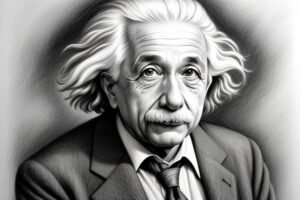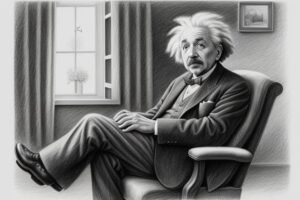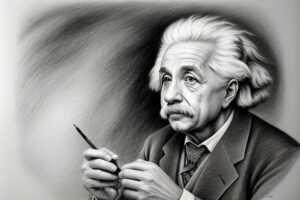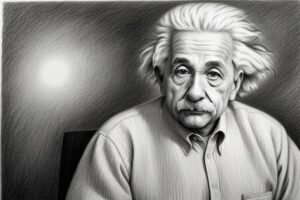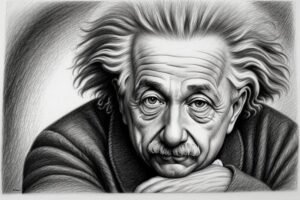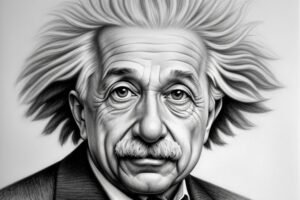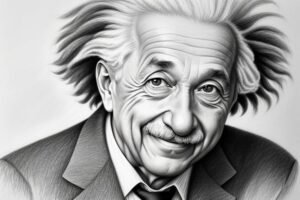Albert Einstein: The Genius Who Redefined the Universe
Albert Einstein, known for his incredible intelligence, transformed the field of physics with his deep theories and understandings. Einstein was born in 1879 in Ulm, Germany, and his path from a curious kid to a Nobel Prize winner and a symbol of scientific thinking is a tale of extraordinary intelligence, determination, and significant influence on our grasp of the cosmos.
Early Life and Education:
Albert Einstein was born on March 14 1879 in Ulm, a small town in the Kingdom of Württemberg in the German Empire. He was born into a Jewish family, with his father Hermann Einstein working as a salesman and his mother Pauline Koch Einstein managing the household. The Einstein family moved to Munich when Albert was a baby beginning his early education in the city.
Einstein encountered difficulties and struggles while attending school. Even though Einstein was considered a prodigy as a child, he faced significant challenges in his education. He gained fame for his rebellious attitude and disinterest in the traditional structure of the formal education system. His teachers found out that he was a disruptive student who liked independent thinking more than adhering to the established curriculum.
During elementary school, Einstein’s academic performance was average. Frequently, he had conflicts with teachers and found it challenging to grasp subjects that did not engage him. His lack of patience for memorization and criticism of the inflexible teaching techniques of his era were viewed as warning signals instead of opportunities. This resulted in low marks in certain subjects and an overall sense of discontent with the traditional education system.
Einstein faced more challenges during his time at the Luitpold Gymnasium in Munich. Even though he did well in areas such as math and physics, his rebellious behaviour negatively impacted his academic record. The strict and controlling German education system at that time didn’t align with Einstein’s curious and independent personality. Frequently, he felt constrained due to the repetitive memorization and absence of mental challenge in his classes.
Transformation and College Education:
Einstein’s unhappiness with his schooling drove him to explore other avenues for his education. When Einstein was 15 years old in 1894 his family relocated to Italy while he remained in Munich to finish his education. This divide marked a pivotal moment in his life. Einstein chose to drop out of school and reunite with his family in Italy where he pursued his education on his own.
However, he successfully obtained a position at the Swiss Patent Office in Bern, where he assessed patent applications for electromagnetic devices.
Einstein took a non-traditional route to the Polytechnic Institute in Zurich, where he began his studies in 1896. While he had some difficulty with a few subjects at first, he discovered his love for math and physics. During his time at the Polytechnic, he experienced meaningful personal development. Even though Einstein encountered difficulties in his studies, his innate curiosity and drive were still evident.
Einstein graduated in 1900 with a degree in physics and mathematics, but had trouble finding a job in academia. Challenges were presented by his unorthodox background and the doubt of the academic community. However, he was still able to find a position at the Swiss Patent Office in Bern, where he assessed patent requests for electromagnetic gadgets.
The Miracle Year: 1905
The year 1905 is commonly known as Einstein’s “Annus Mirabilis” or “miracle year,” signifying a significant moment in his professional journey. During his time as a patent examiner Einstein released four revolutionary papers in the Annalen der Physik. These documents completely altered the field of theoretical physics.
Einstein’s initial paper focused on the photoelectric effect which is the phenomenon of electrons being released from a material upon exposure to light. His theory suggested that light is quantized and is made up of particles known as photons. This idea not only established a theoretical basis for quantum physics but also resulted in him being awarded the Nobel Prize in Physics in 1921. The photoelectric effect showed that light possesses characteristics of both waves and particles, which contradicted traditional wave theories of light.
Special Theory of Relativity:
The Special Theory of Relativity was presented in the second paper, transforming our comprehension of space and time. Einstein suggested that the laws of physics remain consistent for every observer, no matter their motion relative to each other. The equation he is known for,
E=mc2
showed that mass and energy are equal, setting the foundation for future advancements in science, such as nuclear energy.
Brownian Motion:
The third paper provided a statistical justification for Brownian motion, the unpredictable movement of particles in a fluid. Einstein’s research offered proof of atoms and molecules, backing up the atomic theory of matter.
Mass-Energy Equivalence:
The fourth paper regarding mass-energy equivalence broadened the concepts of relativity and elucidated the connection between a system’s mass and its energy. This paper established Einstein’s theories and laid the groundwork for contemporary physics.
General Theory of Relativity:
Einstein’s early 20th century research set the foundation for his General Theory of Relativity, which he finished in 1915. Special Relativity focused on observers in constant motion, while General Relativity expanded this to include acceleration and gravity.
The General Theory of Relativity states that large objects create a bend in the space-time continuum, leading to what we experience as gravity. This theory revolutionized how we perceive gravitational forces, going beyond the traditional Newtonian perspective of gravity as a force acting between masses. Einstein proposed that objects move along curved trajectories due to the warping of space-time, which accounts for effects like the deflection of light near massive objects.
In 1919, the theory was proven right by Sir Arthur Eddington during a solar eclipse as he witnessed starlight bending around the sun, as anticipated by Einstein. This confirmation made Einstein famous worldwide and solidified his position as a prominent figure in the science field.
Career and Impact:
Einstein‘s reputation increased steadily during the 1920s and 1930s. He was a professor at multiple prestigious schools and held significant influence in the scientific world. His theories established the foundation for numerous modern scientific and technological progressions. Nevertheless, his ascent to fame also happened at the same time as political upheaval in Europe.
With the ascent of the Nazi government in Germany in 1933, Einstein, who had Jewish heritage, moved to the United States. He took on a role at the Institute for Advanced Study in Princeton, New Jersey, where he carried on with his research and teaching until he retired.
Einstein made profound contributions to theoretical physics, yet he was equally renowned for his activism on social and political matters. He actively supported civil rights, pacifism, and Zionism. He showed his dedication to these issues through his public addresses and publications, emphasizing his faith in a fairer and more peaceful global society.
Legacy and Influence:
Albert Einstein’s impact reaches well beyond his scientific achievements. His ideas have influenced how we perceive the cosmos and still affect many areas of physics, such as cosmology, quantum mechanics, and gravitational studies. His contributions to the photoelectric effect were crucial for the advancement of quantum theory, whereas his concepts of relativity revolutionized our understanding of space, time, and gravity.
Einstein’s impact is also characterized by his philosophical musings on the relationship between science and society. He stressed the significance of utilizing imagination, creativity, and curiosity in the process of scientific exploration. His well-known statement is that “Imagination is of greater significance than knowledge.” His belief in the limitless power of human thought is summed up in the statement: “While knowledge has its limits, imagination encompasses the entire world.”
In mainstream media, Einstein is frequently portrayed as the ultimate genius, and his name is now equated with exceptional intellect. Yet, his accomplishments were the outcome of extensive studying, testing, and determination over time. His success was greatly influenced by his capacity to question existing norms and approach things from a unique perspective.
More in Video:
Summary
Albert Einstein’s impact on the field of science and beyond is enduring. His groundbreaking ideas, like the Special and General Theories of Relativity, completely changed the core principles of space, time, and energy. Einstein’s revolutionary contributions pushed the limits of human understanding and motivated countless scientists, intellectuals, and creators.
Einstein’s narrative is characterized by exceptional intelligence and significant influence. From facing challenges in school to making ground-breaking findings and promoting social equality, his life demonstrates a path of unwavering inquisitiveness and a dedication to comprehending the cosmos. As we keep investigating the unknowns of the universe, Albert Einstein’s lasting impact stands as evidence of the strength of scientific curiosity and the infinite possibilities of the human intellect.
——————————————————————————————————
FAQs about Albert Einstein:
1. Who was Albert Einstein?
Albert Einstein was a theoretical physicist known for developing the theories of Special and General Relativity.
2. What is Einstein’s most famous equation?
Einstein’s most famous equation is
E=mc2E = mc^2
, which expresses the equivalence of mass and energy.
3. Why did Einstein leave Germany in 1933?
Einstein left Germany due to the rise of the Nazi regime, which persecuted Jewish intellectuals.
4. What was Einstein’s contribution to quantum mechanics?
Einstein’s work on the photoelectric effect supported the quantum theory of light and earned him the Nobel Prize in Physics in 1921.
5. How did Einstein’s early education impact his career?
Einstein struggled in a traditional schooling system but overcame these challenges to become a leading figure in physics.
6. What is the General Theory of Relativity?
The General Theory of Relativity explains gravity as the curvature of space-time caused by mass.
——————————————————————————————————
Albert Einstein’s most famous quotes:
“Imagination is more important than knowledge. For knowledge is limited, whereas imagination embraces the entire world, stimulating progress, giving birth to evolution.”
“Two things are infinite: the universe and human stupidity; and I’m not sure about the universe.”
“The important thing is not to stop questioning. Curiosity has its own reason for existing.”
“Life is like riding a bicycle. To keep your balance you must keep moving.”
“We cannot solve our problems with the same thinking we used when we created them.”
“Insanity is doing the same thing over and over again and expecting different results.”
“Science without religion is lame, religion without science is blind.”
“A person who never made a mistake never tried anything new.”
“The difference between genius and stupidity is that genius has its limits.”
“Peace cannot be kept by force; it can only be achieved by understanding.”


